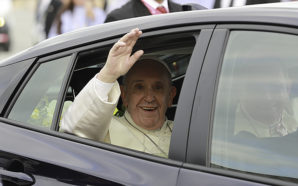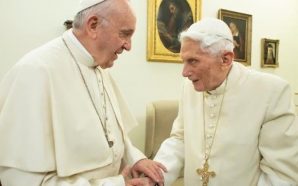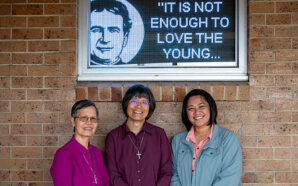It is very early on a Saturday morning. A swarm of parents accompanied by a gaggle of little children prepare the local field for Little Athletics. Every three weeks, a team of families is rostered on to arrive an hour earlier to ensure all is in readiness for long jump, high jump, shot put, the races and an endless stream of events, and to act as officials throughout the day. Many other families have arrived, pitching tents and canopies, settling in for a three-hour commitment.
We were so pleased when our son decided Little Athletics was not for him.
And then there is Mass.
For parishes seeking to engage our families, a multitude of strategies are offered. Children’s liturgy, cry rooms, and rosters full of altar servers. We have Masses where children sing, bring up the gifts and proclaim the readings. We bring children forward for blessings or to share some simple reflections. During sacramental preparation, families are engaged in creative ways during Mass, from welcoming roles, to commitment ceremonies, to offering sheets and displays.
And Mass attendance continues to decline, especially among our young families.
Why does this matter? At its heart, unless the family is involved, then it is extraordinarily difficult to engage the child. And if our children are not engaged, then there is no next generation coming through into our community.
We invest a huge amount in our Catholic schools, in CatholicCare, in our Catholic places of worship, in our ordained and in our staff, and our numbers continue to decline. Streams of volunteers catechise youth in our state schools and we prepare endless numbers of children for the sacraments. And still our numbers decline.
For our Diocese, the drop in average weekly Mass attendance from 2011 to 2016 has been from 50,613 to 47,005 (see National Centre for Pastoral Research report).
Schools recognise that families are the missing ingredient, as do parish teams and ministers. Youth ministry does what it can, hoping that families will engage. Part of our language is “reverse evangelisation”. We hope the child will now catechise or evangelise the parent.
At the same time, the blame game bubbles away. What is wrong with our schools and teaching staff? What is wrong with our parishes and clergy? Why isn’t our youth ministry bearing more fruit? Or we can all turn to gaze disapprovingly at our parents, shaking our heads in collective disappointment. We are offering so much, it is time to do your part.
But I return to those cold mornings at Little Athletics. Actively engaged parents leading the charge. Why are they there? We went with our boy to get him to socialise with others and to help keep him fit and active. We saw that these things were important. And we and others were prepared to help volunteer to achieve these outcomes. Families that pitched their tents valued family time, being together and maybe connecting with a wider network of friends.
What if our registration fee for our child had included a group of professionals that looked after set up and acted as officials? What if they assured us that the children would be kept fit and have fun? What if parents had to go to work while this took place?
What changes? Certain outcomes are still met for our children in terms of content. But a disconnect has crept in between parents and their children. Let’s imagine something else. Now, our parents have never really understood the value of healthy lifestyles. And with all these busy lifestyles, the time for socialising decreases.
But wait, we don’t have to imagine. What Australia experiences today is a rise in obesity among young people and a rise in loneliness. According to a recent VicHealth report, one in four young people experience this loneliness.
Parents can again be seen as public enemy number one. Why aren’t they raising healthy children and encouraging them to experience sport? Governments even offer monetary incentives.
What is missing is community engagement. Governments, businesses and institutions, including the church, are often guilty of offering services on behalf of families, rather than educating them and engaging them in the heart of their work. Even when we propose to “consult”, we often have already developed strategies and there is little true investment with families.
It makes a huge difference when preparing for sacramental preparation if we actually invite the families into a space, give them some formation about what is involved, ask them their expectations, and invite them to help shape the approach we will take for such preparation. This happens in some parishes.
Equally, it makes a huge difference when families become involved in RCIA, in youth ministry, in schools, in caring for those in need. Rather than being passive recipients of services offered, families reclaim their rightful role in being the primary agents of bringing children up in the faith. Rather than providing a program for faith to be learnt, how do we enable a parent to form their child in faith?
Engaging with families takes time, is messy and frustrating, and ultimately amazing, as we realise we have placed the small child in the middle of the circle of discipleship, rather than making plans for them while keeping them on the periphery.
Richard McMahon is the Director of Pastoral Planning & Implementation for the Diocese of Parramatta.








